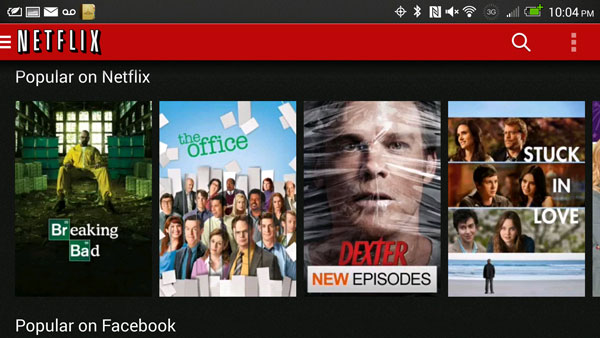Netflix could be looking to change its approach to streaming content, from its current model of handling the data transmission itself, to more of a crowd sourced model similar to that used by bit torrent and other peer to peer networking services. If it did move in that direction, it would end many of the problems the service currently has with ISPs, as it would cut back on Netflix's bandwidth footprint considerably.
This was revealed in a job posting from the company which says it is looking for a senior software engineer, with experience with peer-to-peer technologies. It's not clear whether Netflix is looking to make this a huge investment, but it shows that it is at least willing to consider other options, which is a smart move when torrent streaming service Popcorn time became such a big success over the past year.
If it did switch its streaming services over to P2P, Netflix would likely still need to provide content on a regular basis in-case it isn't available at a sufficient rate from other users. However, letting other users aid in streaming content, even if it was only those that were viewing it live themselves, would considerably cut back Netflix's bandwidth usage and even could help make it possible to distribute content at higher resolutions than it currently provides.
Still, it may need support from ISPs to initiate such a move, as many of them flag up P2P content as related to piracy and throttle it or block it. If that even happens to some people some of the time, Netflix will need to iron out those issues before switching over entirely, perhaps providing a back up option for its traditional streaming model if the new shared content distribution platform doesn't work for everyone.
Discuss on our Facebook page, HERE.
KitGuru Says: Do you guys think a streaming model using peer to peer technology would be a good move for Netflix? Even if it only offered it as an alternative, it would be interesting to see how many people would use it instead.
 KitGuru KitGuru.net – Tech News | Hardware News | Hardware Reviews | IOS | Mobile | Gaming | Graphics Cards
KitGuru KitGuru.net – Tech News | Hardware News | Hardware Reviews | IOS | Mobile | Gaming | Graphics Cards




If you want to use my bandwidth to broadcast your services, don’t ask me to pay you any money for it.
How would this work? Unless they’re talking about storing substantial amounts of buffered data onto the seeding device, surely this will only work for people watching the same content, at the same time, plus or minus so many seconds? What are the chances of that happening?
The bandwidth isn’t yours, it’s owned by the cable company. The amount you’re provided is by no means your decision and ISPs are perfectly within their rights to both throttle and redistribute the bandwidth on your line, something which they do all the time, through BT’s home hub routers, and DLM used by them and everyone else as well.
No, I pay for the bandwidth and I’m not going to let someone chip my upload speeds away from me and slow me down at whatever it is I want to be doing.
►►► $73.. per-hr @mi9//
,
➨➨➨https://WorldStarHipHopHosts.com/skills/help…
What are you going to do, go to your local exchange, hack the routers and turn off the DLM? You don’t have control of your bandwidth, it’s probably being dynamically adjusted as we speak. Like I said, you’re no more in control of it than you are the road outside your house, and if you don’t believe me then call your ISP up and ask them yourself.
Obviously no one has full “control” of their bandwidth. Which makes JonFX01’s concern even more valid. Data interfering with my download/upload speed is something to keep tabs on. (Can’t trust those ISP’s and big cable companies) And to the point that I can “control” my data flow, I’ll do it. So if Netflix wants to go p2p, I’m cancelling. Why? Because I don’t want to share my bandwidth for a service I’m paying for. Not to mention the litany of security concerns that p2p bring.
*shakes head*
I still don’t think you’re getting it. The data pipe that connects you to the exchange is not a single individual wire, exclusively wired from your modem to the routers in the exchange. Most likely you join a telegraph pole immediately outside your house, or, at very most, a switch at the end of your street if you’re on fiber.
So the bandwidth that is available to you is not some fixed upper limit that’s determined by some physical aspect of the cable connecting your modem to the nearest junction, it’s determined by *software* in the exchange, which dynamically load balances the data sent out to each house’s modem, depending on any number of different things, but will generally make it as even as possible. This is why at some peak times, you will see your connection speed drop markedly – across all websites and external addresses you visit. This is due to lots of users around you being online at the same time, and the DLM software on the exchange accounting for that.
If you run speedtest in your browser, you will see that your upload speed is far slower than the download. This is because 99% of the time, we’re not uploading anything, and when we are, it’s very, very small amounts of data. This is a facet of our current preference for individual computers, where basically anything you access online is essentially downloaded on your device, which then does all the processing to make it work, and 99% of the interaction you have with the device is local, i.e no data needs to be sent away for you to interact with the site.
So, given this fact, if Netflix were to implement its P2P method, if everyone on your street was assigned say 500kbps upload speed, the chances are next to no-one will be uploading, and if they are, probably maybe just a few bytes of data. This means, if you decide you want to watch a film, and somewhere else someone was to leech off your seed, the routers in the exchange would simply allocate you the upstream bandwidth that your neighbours aren’t using, just the same way that when you’re watching a film on Netflix, it has most likely allocated you a greater share of downstream bandwidth.
This is a money saving tactic. It’s all about realising that large, rather than build, say, 1000 parking spaces in the town centre, instead you encourage people to come at different times, and the allocate them a space that has been freed up, as no-one else is currently using it.
This is all ignoring the very obvious fact in the first place that upstream and downstream bandwidth are different, and, as I said before, the total is limited only by what the exchange assigns to you, not some physical, “volume” of the data pipe to your house. So any seeding that you provided would have absolutely no effect on your download speed anyway.